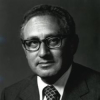Henry A. Kissinger

Henry A. Kissinger
Henry Alfred Kissingeris an American diplomat and political scientist. He served as National Security Advisor and later concurrently as United States Secretary of State in the administrations of presidents Richard Nixon and Gerald Ford. For his actions negotiating the ceasefire in Vietnam, Kissinger received the 1973 Nobel Peace Prize under controversial circumstances, with two members of the committee resigning in protest. Kissinger later sought, unsuccessfully, to return the prize. After his term, his advice has been sought by world leaders...
NationalityGerman
ProfessionStatesman
Date of Birth27 May 1923
CountryGermany
We are doomed to coexist.
A little uncertainty is good for everyone.
To be an enemy of America can be dangerous, but to be a friend is fatal
When I became security advisor, I became familiar with the so-called SIOP war plans, I called in Secretary McNamara and asked him what they were hiding from me, because I couldn't believe that the National policy would foresee such a level of destructiveness.
My country's history, Mr. President, tells us that it is possible to fashion unity while cherishing diversity, that common action is possible despite the variety of races, interests, and beliefs we see here in this chamber. Progress and peace and justice are attainable. So we say to all peoples and governments: Let us fashion together a new world order.
An Iranian moderate is one who has run out of ammunition.
Withdrawal of US troops will become like salted peanuts to the American public: The more US troops come home, the more will be demanded.
The emigration of Jews from the Soviet Union is not an objective of American foreign policy. And if they put Jews into gas chambers in the Soviet Union, it is not an American concern. Maybe a humanitarian concern.
Every civilization that has ever existed has ultimately collapsed. History is a tale of efforts that failed, or aspirations that weren’t realized . So, as a historian, one has to live with a sense of the inevitability of tragedy.
Administration has managed the extraordinary feat of having, at one and the same time, the worst relations with our allies, the worst relations with our adversaries, and the most serious upheavals in the developing world since the end of the Second World War.
At any rate, mutually assured destruction was never our policy.
One theory is that we will make war look so attractive that we undermine the deterrent. That's Never Never Land. What we have now would have been enough to deter Hitler. But we are talking in a different order of reality.
I go out with actresses because I'm not apt to marry one.
We believe that peace is at hand.